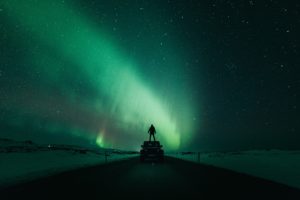“Is It All Worth It?” A Humanist Question
 Photo by Kristopher Roller on Unsplash
Photo by Kristopher Roller on Unsplash There’s a line close to the end of the film Arrival where the lead character, a linguist played by actress Amy Adams, says, “Despite knowing the journey and where it leads, I embrace it, and I welcome every moment of it.” To me this short sentence fulfills to its core the essence of the humanistic and non-believer worldview. That indeed we acknowledge where this journey will take all of us in the end, but as we rage at the dying of the light, we make our way through the world never giving up on ourselves and each other to live good, kind, and productive lives of reason and compassion.
Taken another way, we can look backwards to Woody Allen’s 1977 film Annie Hall for a similar if more humorous sentiment. When Allen’s character is asked to sum up the seemingly fruitless aspects of why we go on, he uses the story of the man who is diagnosed as believing he is a chicken. When his doctor asked why he wasn’t brought in sooner for diagnosis, the man’s family responded, “We needed the eggs.” So yes, there is pain and suffering, and life at times is dim as it can be joyous, but we go on. We challenge convention, authority, and our own behaviors. Even if we can’t explain all our motivations and actions, we keep going because in the end we all need the eggs, too!
Here we must acknowledge the difference between fate and destiny. The fact being that while all of us are living now and all who came before us and who will come after us, all will have different destinies. We cannot control which family we were born into, nor our birth geographies, nor our personal birth demographics. Complicating this are the challenges and opportunities that will shape our personal and familial experiences, like our culture, our socio-economics and politics, our education and careers, etc.
All that enculturation, all of these things and more, will bring us into contact with each other. Always in small and grand ways to make our lives meaningful, scary, trustworthy, and at times full of hope and love as well as sorrow and suffering.
But in the end, regardless of destiny all humans, indeed every living species on the planet will suffer the same fate. We will perish. Gone. All the things we worry about will end when we lose final consciousness. Our loves and dislikes, the issues we cared about, and our own sense of identity and belonging will go away. It will never come to be thought of quite the same because we will never be again.
But that reality should not deter us from living. In fact, I argue that knowing the difference between fate and destiny plays a big role in what makes us human. Reaching this level of self-awareness makes us activists and advocates for ourselves and others. It has the potential to break down rather than put up walls or other barriers. It is indeed liberating to know–even in the short time we are all here, and this being our only opportunity for any form of legacy—that we must take the shot, or at least try. If not for our personal legacies, then for the legacy of our common humanity.
Indeed, I would also argue that the confluence of complex language, advanced tool making, the development over the last 150,000 years of social integration, the development of our scientific practices, all play a role and work together with our humanistic values. That understanding the material cosmos (i.e., nature) is equal to and better than hoping for magic to solve our problems or grant us our wishes. That this conundrum of reality also is a very large part of what makes us human.
The wisdom of not knowing our full destiny, but knowing our ultimate fate can make people afraid, creating feelings of flight or fight. I believe it is why little kids are scared of the dark and why adults fall back on religious belief to fulfill the need of both a supernatural preeminence as well as spiritual permanence which are never guaranteed nor real in the case of a deity.
So, the best choice of action is to embrace our frailties. Our imperfections. Our common humanity. Our beauty as a species as well as our destinies and fate in equal proportion. Because what choice do we have? Frankly, all of humanity needs the eggs.
